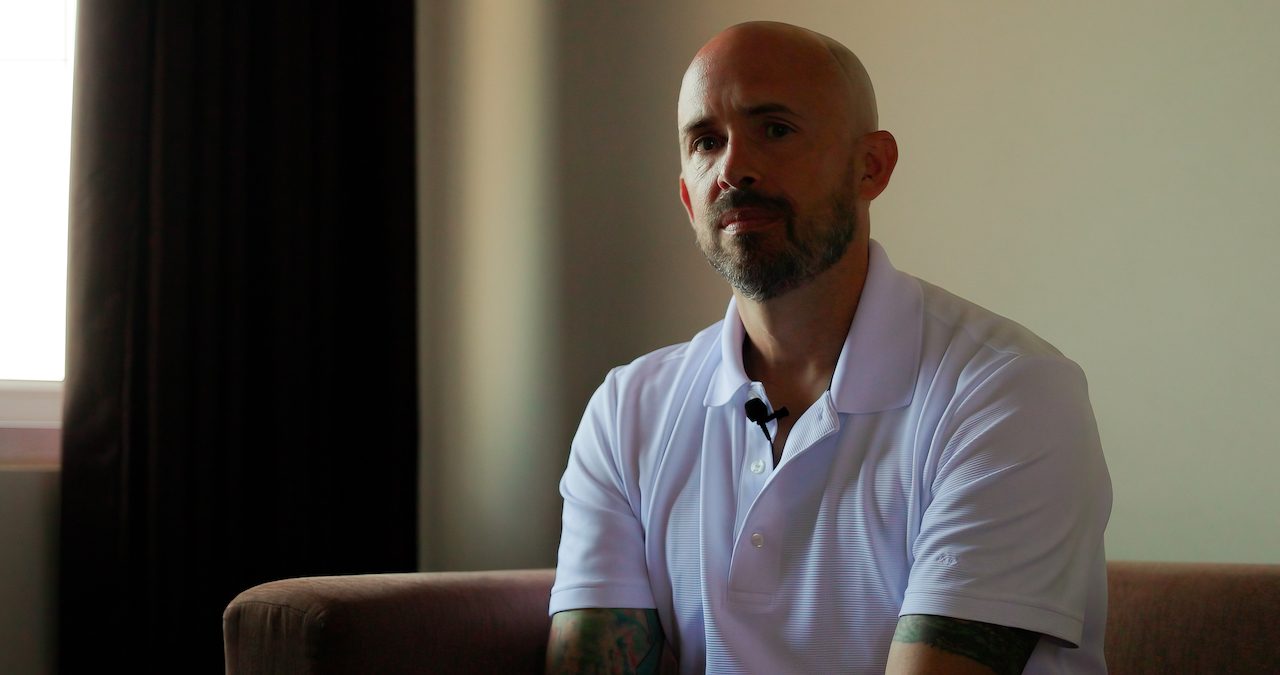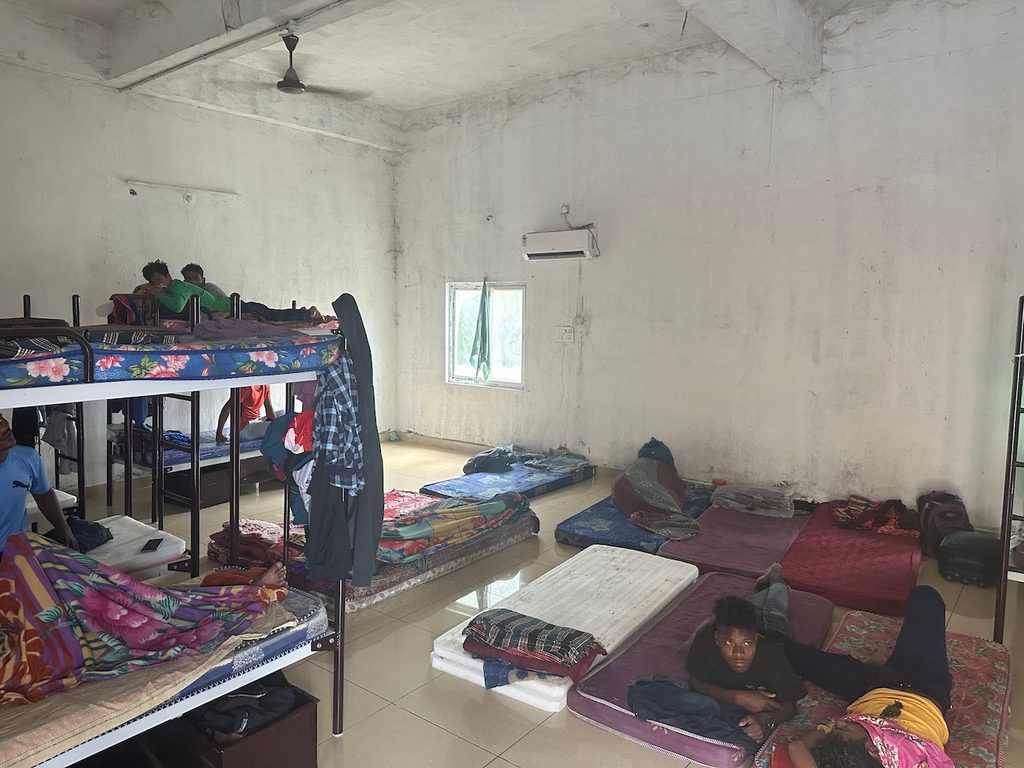SUMMARY
This is AI generated summarization, which may have errors. For context, always refer to the full article.

Editor’s Note: This story was produced by The Outlaw Ocean Project. Rappler is publishing it with permission.
On October 29, 2023, a 45-year-old American named Joshua Farinella flew into the city of Amalapuram near India’s eastern coast to start his new job as the general manager at a shrimp processing plant. Surrounded by a seven-foot-high concrete wall, the plant, leased by a company called Choice Canning, was about six miles northeast of the city. Security guards patrolled the perimeter. Inside was an eight-acre compound where shrimp, cultivated in nearby ponds, were processed and shipped abroad.
In recent years, India has exploded as the dominant source of shrimp for much of the world. In 2015, reporters found trafficked Burmese migrants held in slave-like conditions in shrimp peeling sheds in Thailand, a country that for much of the prior decade had been the preferred supplier for major Western supermarkets. Some of these food companies cut ties and imports from Thailand dropped.
India helped fill the void, with support from its government through subsidies and loosened foreign investment restrictions. By 2021, India exported more than $5 billion of shrimp globally and was responsible for nearly a quarter of the world’s shrimp exports. Choice Canning is one of the largest Indian suppliers in the market, with corporate offices in two big Indian cities, Kochi and Chennai, as well as in Jersey City, N.J.
When he arrived at the Amalapuram plant, Farinella was struck by the number of workers streaming through the gate. On any given day, there might be more than 650 workers at the plant, typically hired by third-party contractors. Hundreds of the workers lived locally in Andhra Pradesh and went home at the end of each day. The rest were migrant workers who lived at the plant, mostly women who were recruited from impoverished corners of the country. They slept in spartan dormitories on-site in metal bunk beds. A security guard was usually posted outside near the building’s front door.
Farinella was raised in a former mining town in Pennsylvania, and had gone off the rails as a young man, living on the street temporarily and picking up convictions including for drunk driving and trying to cash false checks. He had worked in the food industry since 2015. Choice Canning made frozen meals in his hometown and gave him a job as a quality-assurance officer, overseeing food-safety rules. He then worked for another seafood company, ensuring its supply chain complied with regulations, before returning to his old firm in 2023. He was used to gaps in accounting and flaws in audits. But the problems he was now exposed at the Choice Canning plant in India seemed much more serious.

Soon after he started the new job, Farinella found himself having to cover up overcrowding by making plans to hide workers when inspectors came around. He was also pressured to mislead customers about the provenance and quality of their shrimp, including its certification status or farm origin, and was told to send off consignments of antibiotic-laden shrimp to America. (In the US, the Food and Drug Administration bans the use of such drugs in shrimp.)
“I have been fighting this from afar for years,” he later said, referring to his time in food safety and quality assurance. “Then I find myself right in the middle of it. Not just in the middle of it, but it was literally my job to make all of the fucked up things keep happening.”
Within two weeks, things came to a head for Farinella. At 3 am on November 11, 2023, a manager sent a WhatsApp message informing him that a woman had been found running through the plant’s water treatment facility. “She was searching for a way out of here,” the manager wrote. “Her contractor is not allowing her to go home.” The woman made it as far as the main gate but was turned back by guards.
Forbidding workers to leave their plants when they choose to is a violation of the Indian constitution and also likely violates the country’s penal code, according to the Corporate Accountability Lab, an advocacy and research group. When Farinella arrived at the plant, several hours later, he tried to get an answer about what had been going on – and was told by an HR manager that it had all been a misunderstanding. The woman had not wanted to leave after all. An alarm bell went off in Farinella’s mind.
Farinella would soon decide he could not continue with Choice Canning, but, torn about what he had witnessed, he chose to collect documents, including spreadsheets of worker headcounts and wages, product tracking records, text messages on WhatsApp, e-mails and recorded phone conversations.
In response to a detailed set of questions about Choice Canning’s business, labor and safety practices, a lawyer for the company wrote that it categorically denies the allegations made by Farinella, whom it said should not be trusted due to his criminal record.

The company also said that documents from Mr. Farinella had been manipulated. (Upon request, a private firm that specializes in forensic data analysis reviewed a selection of the documents, including those specifically cited by Choice Canning, and they verified that they were not manipulated in any way.)
“Today, Choice’s mission remains the same since its founding: an unwavering commitment to providing a wholesome dining experience to all – right from the comfort of home,” the company’s statement said.
In January of this year, less than three months after starting his job at the plant, Farinella contacted The Outlaw Ocean Project and handed over the information he had gathered. “I think it is likely that I was hired not to manage the facility, but to be the American face that provides the appearance of legitimacy,” he said. “I’m afraid I can’t be that face.”
“Ship it,” the WhatsApp message read.
This was surprising, even by the standards Farinella had come to expect at Amalapuram. His boss, Jacob Jose, the company’s vice president of sales and procurement and the son of CEO Jose Thomas, who goes by JT, had just been informed that 225 cases of raw shrimp bound for Aldi South supermarkets in the US had tested positive for antibiotics.
Much of the shrimp that India produces are raised in small aquaculture farms. The Corporate Accountability Lab found in a report released this month that many of these farms rely on antibiotics to protect the shrimp from pathogens. The widespread use of antibiotics in agriculture is leading to a rise in antibiotic-resistant bacterial infections around the world.

Farinella said he was confused to find that when the plant tested for antibiotics in the shrimp, these tests came back positive more often than he had expected. He also said the paperwork the plant used to trace shrimp to certified farms and track the presence of antibiotics was sometimes misleading.
Jacob Jose told him not to use the word “antibiotics” in internal communications. For shrimp that had tested positive with antibiotics, Jose asked him on WhatsApp to instead use the word “Oscar,” adding “lol.” (The company denied ever shipping antibiotic-tainted shrimp to the US and said that this exchange and the meaning of “Oscar” have been misrepresented by Farinella.)
Farinella said he did as he was told. “Almost 10,000 pounds of Oscar in finished packaging for Wakefern.” he wrote on WhatsApp to Jacob Jose on February 1, 2024. “What to do?”
“Ship on one container,” the executive texted back.
Off it went to America, packaged in bags marked “all natural.” (Wakefern, a US retail cooperative, did not respond to requests for comment.)
During his time as the plant manager, Farinella had a wide range of duties: sourcing workers and supplies of shrimp, managing finances, and making sure that plant hit its monthly production quota.
Farinella struggled at first to establish how many workers lived on-site, how they were housed and fed, and how their contracts worked. At one point he stumbled across what he called a “hidden dormitory” located above the ammonia compressors used for refrigeration, putting the workers in danger if there were a leak or a fire.
Farinella said he was concerned when he found workers sleeping on the floor, but he said he and others struggled to get authorization for the necessary changes. “We need more bunk beds immediately, this cannot wait for another day please!” the plant’s vice president of human resources wrote in an email. “Existing people are facing trouble for months.”

A few weeks later Farinella discovered during a recorded conversation with two labor contractors for Choice Canning that 150 workers had not had a day off in a year. The contractors asked whether they could be released for an outing. Farinella approved it instantly.
It was also hard, he said, to tell how long employees spent working. A human-resources executive admitted candidly in a Zoom meeting recorded by Farinella how she would need to adjust attendance records and timecards for an audit.
State law in Andhra Pradesh stipulates that workers must be paid at least 450 rupees ($5) per day. But an invoice from a labor contractor and emails between managers seemed to indicate that some workers were paid only 350 rupees a day. (The company has since said that it always paid the minimum wage to all of its “associates” and recently even gave a raise to some of its staff.)
“It felt dirty,” wrote Farinella later. “I know the workers couldn’t be OK with everything there. And I also knew that every one of them probably thought I was most of, or at least part of, the problem.”
In December, Farinella asked Jacob Jose if workers could be paid the minimum wage. In a following email exchange with senior executives, JT declared himself “shocked” that they weren’t already. One of the executives reminded JT that he had previously told them “not to make any changes in Amalapuram for time being,” when it came to wages. (In internal emails, company managers later said they planned to raise the wages.)
In January 2024, inspectors from Aldi South, a global supermarket chain, were due to visit Amalapuram to conduct a social audit checking labor conditions at the plant. While some audits are unannounced, Aldi South’s audit was scheduled in advance. Farinella met other supervisors to discuss preparations, and recorded the conversation.
Managers focused on what to tell auditors with regard to the number of workers at the plant. (Auditors typically check the tally of employees at a facility against wage records, available beds, and amount of workspace on the factory floor to see if there are any concerns related to underpayment or safety, according to the Corporate Accountability Lab.)
The managers discussed a plan to move the workers off-site before the auditors arrived. “We need to show a sizable number to them,” mused the quality-assurance officer during a recorded meeting. Eventually, the managers opted for 415 as a plausible number.

A few days later, in a recorded meeting, Farinella discussed the plans with a human-resources executive.
“So, basically,” he said, “when the auditor comes in, we’ll call them and say ‘go run away and do something else for the day.’”
“Yes,” said the executive.
“How the hell did you come up with that idea?”
“Sir, JT is keeping a knife on my neck. Ideas will come.” (Aldi South said it was “taking the allegations seriously” and would need more time to investigate.)
In January, after Farinella decided to go public with what he knew, a videographer traveled to India to document conditions at the plant. A few days later Farinella flew back to America and emailed the company his notice from the airport. Farinella retained a lawyer and filed a formal whistleblower complaint to several US federal agencies
The same day, Aldi South’s auditors arrived in Amalapuram to conduct the inspections that the local managers had been discussing for weeks. After the audit was finished, Farinella contacted his former colleagues and asked whether they had relocated workers as discussed. Two of the managers confirmed that they had.
“Exactly, sir,” one wrote on WhatsApp. “All workers are sent outside.” – Rappler.com
This story was produced by The Outlaw Ocean Project with contributions from Maya Martin, Jake Conley, Joe Galvin, Susan Ryan, and Austin Brush.
Add a comment
How does this make you feel?
























There are no comments yet. Add your comment to start the conversation.